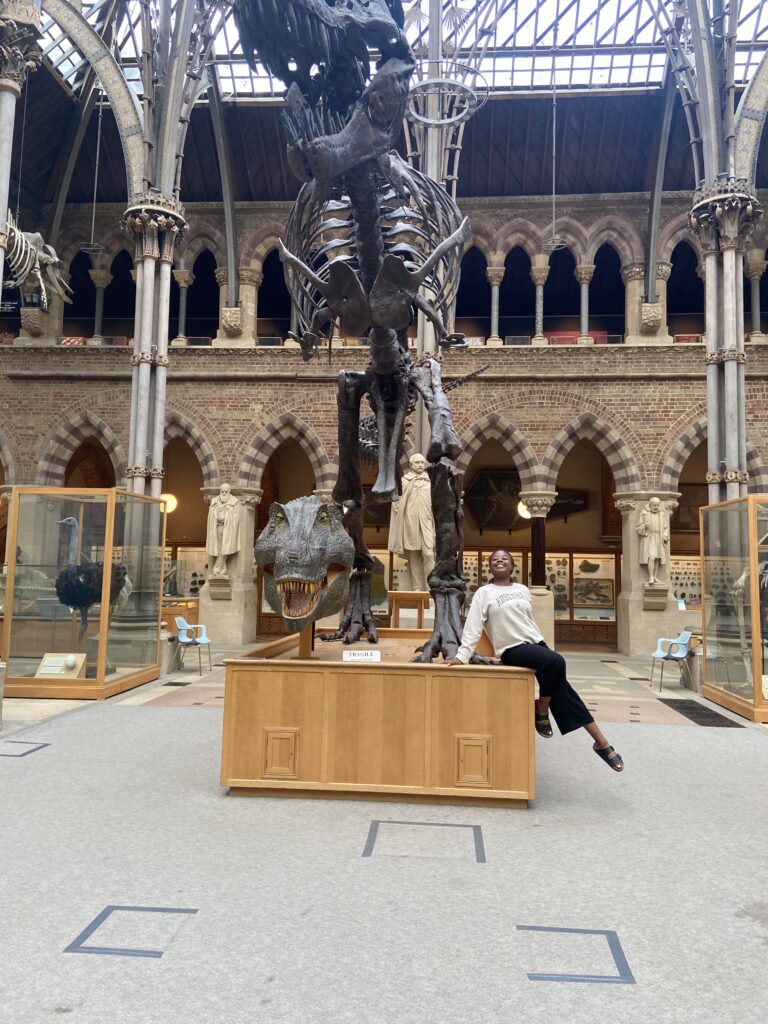By Francisca Rockey
During the summer of 2022, I interned at Oxford University’s Natural History Museum (OUMNH) as part of their Undergraduate Bursary scheme. OUMNH houses a large collection of natural history specimens, as well as archives from the likes of Mary Anning, Charles Darwin, and William Burchell. Their annual undergraduate bursary scheme is an opportunity for second-year students from a widening participation background to gain hands-on experience working or researching at the Museum. Each bursary covers a full-time, six-week project at the Museum, supervised by a member of the OUMNH team. In addition, students are given a stipend (£2,250 in 2022) towards covering living expenses. Accommodation, either at the museum lodge or within one of the colleges of Oxford University, is provided free of charge.

Francisca is pictured next to the Tyrannosaurs Rex model in the OUMNH’s main court – Credit: Charlie A Lamb
Prior to the internship, I had a sustained interest in biogeography and ecology developed during the course of my degree. I was also keen to engage with and promote the involvement of under-represented groups within science, though I had little sense of how someone from my background might forge a career in the museum sector, or even what working in a museum was like. I knew that there were curators and front of house staff, but I was surprised to learn that there were education and learning officers to support the work of the museum. I felt that my existing skills from previous work experience and voluntary positions – having supervised young people undertaking expeditions to study environmental processes; and undertaking a marketing internship that involved engaging families with local nature reserves – would complement the requirements of working in public engagement role within a museum. Sure enough, this opportunity not only provided a great insight into what working in a museum was like, and the opportunities available, but also helped to develop my science communication skills and allow me to explore the possibilities of a career in education outside the traditional classroom setting.
My Public Engagement internship at OUMNH comprised of two parts. Part one involved an introduction to public engagement where, as interns, we developed our own science outreach activities for children, age 3-11, and their families. Part two engaged us in mentoring and supporting young people, aged 16-18, who were undergoing Nuffield Research placements or working as part of the Natural Science and Heritage Scheme.
Over the course of 6 weeks, I was introduced to various roles in the Museum, from education assistants, learning officers and archivists to conservators and collection managers. Through weekly workshops with museum staff, delivering family activities with visiting members of the public, and working with SEND as well as early-years (KS1-2) audiences, I developed my teaching skills using objects (museum specimens) and a range of crafts (posters, colouring sheets, take home activities, trails, physical games and competitions). I also practised creating resources using specialist software, such as Adobe Indesign and Serif PagePlus.
What I enjoyed most about the internship were the weekly trips to other Oxford museums to learn about how public engagement works in different museum settings. I particularly enjoyed our afternoon at the Pitt Rivers Museum where we took part in their summer art challenge. I enjoyed the creativity involved in this kind of public engagement, and having the ability to practice your artistic skills amongst collections of artefacts with such varied of patterns, colours, and material surfaces.
Working as part of the OUMNH Public Engagement team was both insightful and fun, giving me the opportunity to experience a new city, life as an Oxford student and make like-minded and hopefully, life-long friends. The internship also aligned directly with my career plans and long-term commitment to engage diverse communities with natural history and associated sciences, as well as equipping me with necessary transferable skills and experience ahead of my graduate and postgraduate career.
Author Bio: Francisca is a final year BSc Geography student at York St John University who is interested in conservation, biodiversity and African ecology. Currently, she is writing her dissertation which aims to evaluate the influence of video games on pro-environmental behaviour. Upon completion of her degree, Francisca will be joining Atkins as a Graduate Environmental Consultant in Autumn 2023.